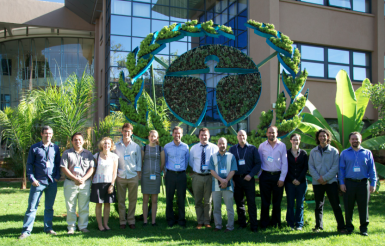This article by Mairead Rocke was originally published on the Blue Carbon Portal: you can read the original post here
On the 17th and 18th of January 2013, the validation workshop for the GEF Blue Forests project was held at the UNEP headquarters in Nairobi. This project is entitled ‘Standardized Methodologies for Carbon Accounting and Ecosystem Services Valuation of Blue Forests’. It is a four-year project, which aims to demonstrate how the incorporation of carbon and other ecosystem services values into local, national and international markets and coastal management plans can ensure the long-term protection of Blue Forest ecosystems.
Blue Forests are coastal ecosystems, mainly mangroves, salt marshes and seagrasses, which typically contain higher carbon stocks per unit area than tropical rainforests. However, Blue Forests are not only important to climate change mitigation. Coastal communities value these ecosystems for a number of different reasons, ranging from the food security that might be provided by fisheries to the protection they offer from storms and flooding. Despite this, Blue Forests represent one of the highest rates of ecosystem loss globally (Nelleman et al., 2009). Therefore, identification of how these different ecological, economic, social and cultural values may be used to sustain the restoration and conservation of coastal ecosystems is timely.
The validation workshop marked the first formal meeting of project partners, who discussed matters relating to the Full-Sized Project Proposal (FSP) that will be submitted to the Global Environment Facility (GEF) in March. Essentially, the FSP consists of the documentation that is reviewed by the GEF and which subsequently determines whether a project is approved. As the executing agency, GRID-Arendal chaired the workshop alongside UNEP, the implementing agency.
Over the course of the project, methodologies and approaches for carbon accounting and ecosystem services valuation will be explored in the following intervention sites:
1. Madagascar (Blue Ventures)
2. Ecuador (Conservation International)
3. Indonesia (Indonesian Ministry)
4. Mozambique (World Wildlife Fund)
5. Abu Dhabi (AGEDI)
Three Advisory Panels, specializing in carbon science, ecosystem services and policy, will offer coordinated support to these interventions and assist in bringing project findings to an international platform. The panels are led by Duke University, UNEP and the International Union for Conservation of Nature (IUCN) respectively.
The validation workshop identified the priorities to be addressed moving forward. The responsibilities and expectations of each project partner and component were discussed, and an immediate plan of action to ensure that these are incorporated into the project proposal was agreed. It marked a milestone achievement in the development of the GEF project, currently the largest and most comprehensive global effort to implement Blue Forest concepts through management on the ground.
Reference:
Nellemann, C., Corcoran, E., Duarte, C. M., Valdés, L., De Young, C., Fonseca, L., Grimsditch, G. (Eds). 2009. Blue Carbon. A Rapid Response Assessment. United Nations Environment Programme, GRID-Arendal, www.grida.no


